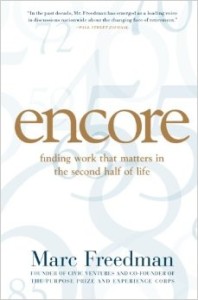
In Encore, author Marc Freedman describes the unsustainable nature of the retirement culture today. Evaluating the size of the Baby Boomer generation, Freedman concludes that the current crop of retirees needs to carve out a new niche in the workforce to ensure both economic prosperity and the appropriate delegation of existing talent. Encore encourages the reader to consider what passions they could invest in a second career. To this end, Freedman quotes developmental psychologist Erick Erickson: “I am what survives of me.” Encore targets readers who want encouragement to make use of their talents for an impactful third act.
Freedman counters the popular notion of retirement as a time for leisure and leisure alone. He uses a variety of real-life examples to illustrate that Boomers comprise a vibrant pool of talent, with valuable contributions still to offer. Freedman attributes labor market shortages in the energy and healthcare fields to the large numbers of retiring Boomers. For retirement-age individuals seeking work, Freedman recommends a number of organizations that actively recruit older workers, such as ReServe, Experience Corps, and Troops to Teachers.
My Take
Encore deconstructs the notion of the Golden Years, portraying it as a phase invented in the mid-20th century by the financial service industry. Freedman argues persuasively that the Golden Years concept is a marketing scheme, and not a legitimate phase of life. In the 1960s, retirement communities such as Leisure World and Sun City helped cement the profitable business of retirement (p. 54).
On the surface, these institutions embraced the “keeping busy” ideal of retirement, yet simultaneously encouraged the development of a leisure class. For decades, our culture embraced the idea that keeping busy is good for retirees. Freedman takes this opportunity to raise an excellent question: Why shouldn’t retirees “keep busy” doing something that gives back to the community, and makes use of the skills they developed during their careers?
Critique
Critics of Encore have pointed out that Freedman’s idea of an encore career consists of low-paid jobs, in mostly altruistic positions. This notion of the purpose-driven encore career does rely on the assumption that retirees, while still desiring to generate income, no longer have as many financial burdens as they did in their 30s and 40s. Of course, this might not be true of every retiree.
But Encore emphasizes that a Golden Years retirement doesn’t work for everyone, a valuable message for any retiree, no matter what kind of work they want to pursue after retirement. Freedman is a founding member of Encore.org, a site that matches retirees with purpose-driven careers, so an emphasis on non-profit, healthcare, and teaching positions should be expected.
Freedman laments the lack of a term for this current generation of retirees, reviewing and dismissing a list of established suggestions (p. 104). He makes a compelling case that having a term for retirees starting a second career would help make starting that career more an accepted norm. It was a little disappointing that he didn’t suggest any terms himself. He argues that the third age will develop a unique moniker with time, much as the term teenager came into existence at the turn of the century.
In the meantime, with the help of books like Encore, readers like you can help ensure encore careerists quickly become an invaluable sector of the American workforce.
Conclusion
For years, Marc Freedman has honed his creative re-thinking of the Golden Years myth of retirement. Some reviewers have criticized his book for not offering enough step-by-step instructions. That misses the point. The importance of this book is to reframe society’s thinking about retirement – especially crucial at a time when Boomers are poised to strain every inch of the system, from Social Security to long-term care. For those looking for specific instructions for what to do next, consider Marci Alboher’s Encore Handbook. Encore also provides an appendix with a long list of resources, with some that provide step-by-step instructions.
Encore attempts to break through the pervasive marketing mythology created in the last century. This is valuable work, executed thoughtfully from an optimistic perspective. No matter what kind of third act you want to pursue, Encore offers a valuable message of encouragement.
